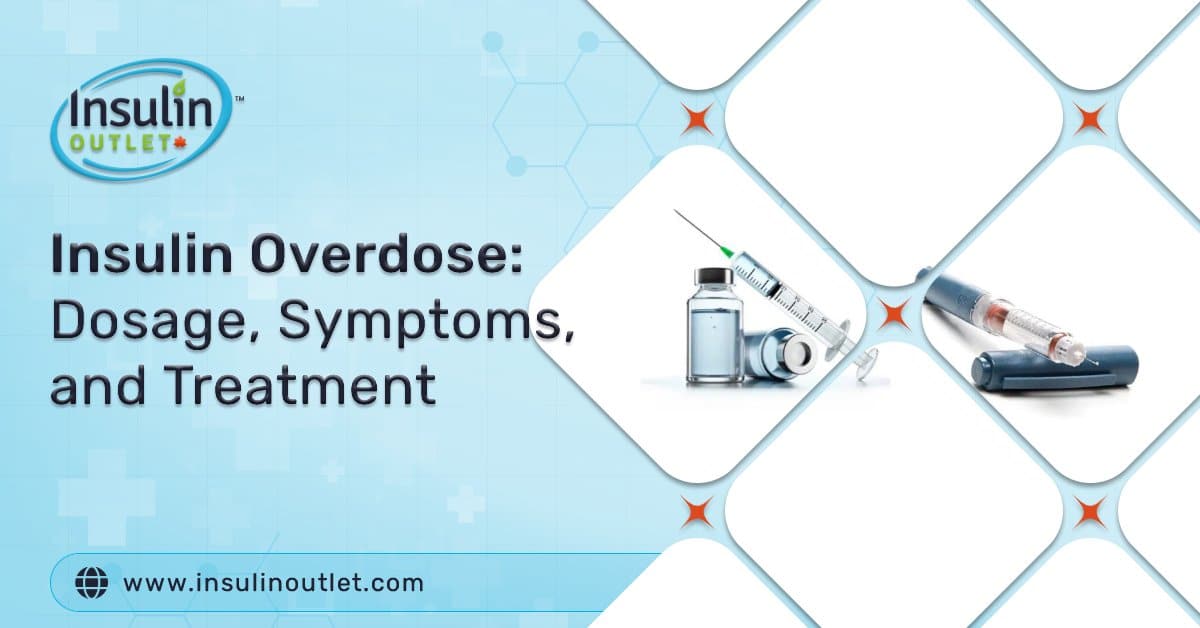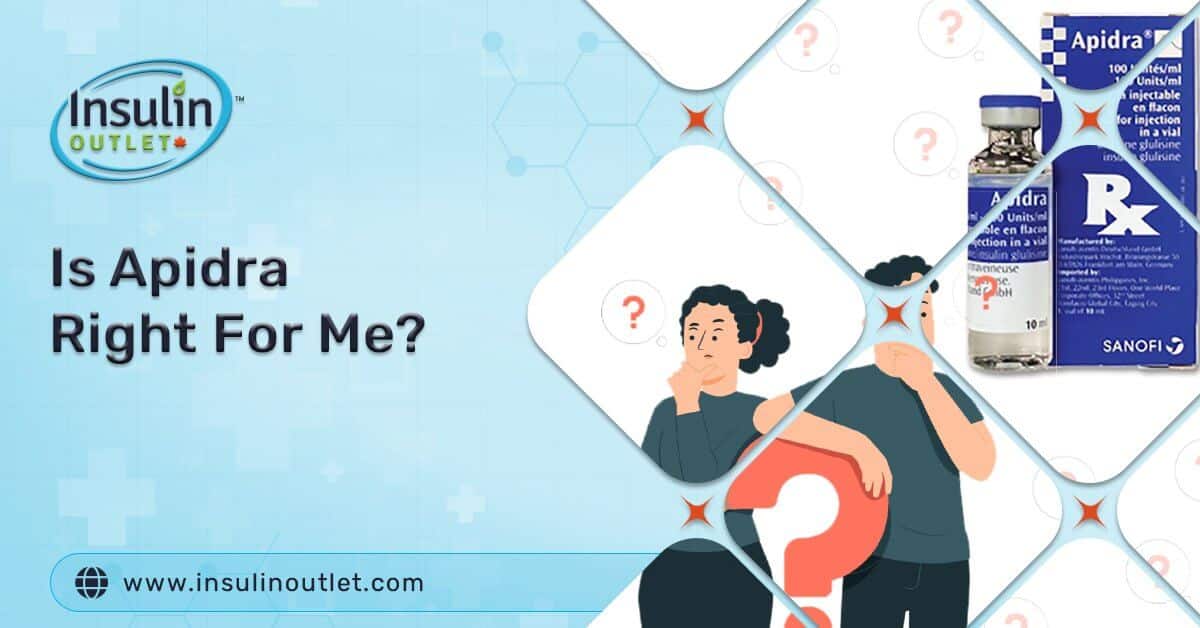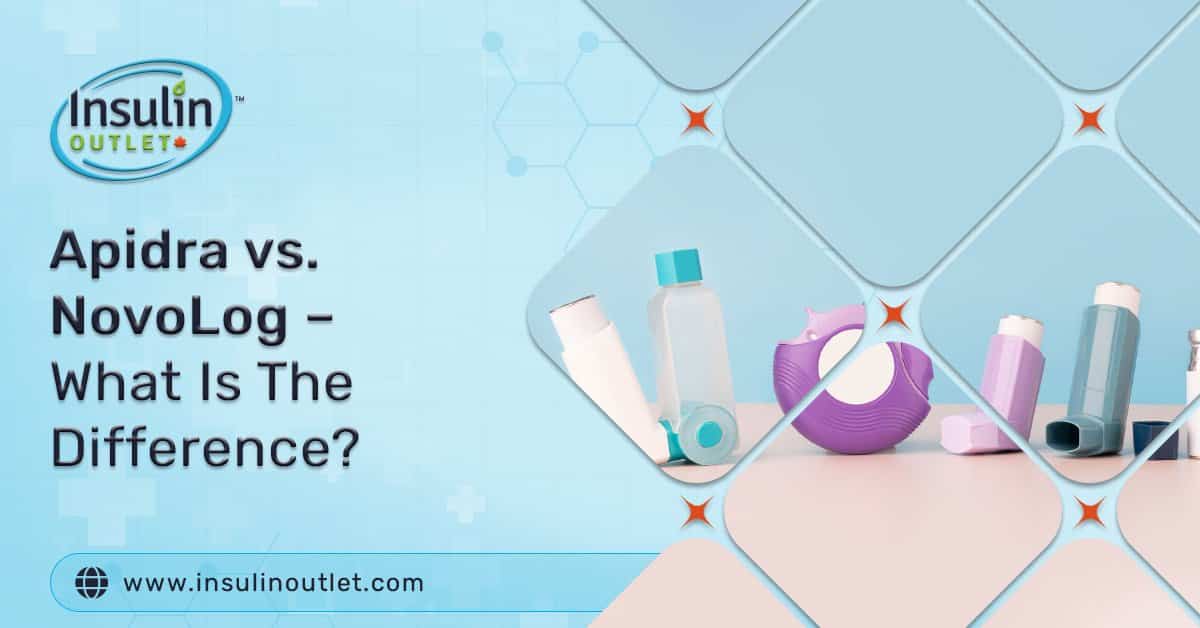
Insulin is a life-saving drug for people with diabetes. It plays a vital role in lowering blood sugar levels, helping to move glucose from the bloodstream into the cells, where it gets turned into energy.
Too little insulin in the organism is dangerous because it leads to hyperglycemia when glucose builds up in the blood, which is potentially life-threatening.
However, too much insulin also poses a serious threat to one’s health and life, and that’s why it is imperative to know how much insulin is too much and what to do in case of insulin overdose.
This article will provide you with the answers to those questions.
Table Of Contents
Toggle- How Much Insulin Is Too Much?
- Insulin Overdose Symptoms
- Humalog Mix 25 KwikPens 100 Units
- Fiasp FlexTouch Pens 100 Units / mL
- Apidra SoloStar Pens (100 Units/mL)
- Basaglar KwikPens 100 Units / mL
- Causes of Insulin Overdose
- Groups of Increased Risk
- How To Avoid an Insulin Overdose
- Insulin Overdose – Final Thoughts
- References
How Much Insulin Is Too Much?
Determining the proper insulin dose is not as easy as it may seem.
For one, safe insulin doses will differ from person to person. Moreover, they can be different depending on the day and even the meal, which means diabetes patients need to keep adjusting insulin doses based on their current needs in order to keep their blood sugar steady.
Some of the variables that may affect insulin dosing are:
- high carbohydrate meals, which require higher insulin doses;
- planned physical activity, which usually improves your insulin sensitivity therefore, you may need to administer a smaller insulin dose;
- illness, which may increase or decrease your insulin intake needs;
- other medications.
While trying to assess the safe insulin dose, you also need to consider the type of insulin you administer.
Short-acting insulin usually takes effect within 30 to 60 minutes after you take a dose. This type of insulin is administered multiple times a day before your meals.
Long-acting insulin, on the other hand, works to keep your sugar level steady between meals and throughout the day. Basal insulin can work for up to 24 hours, slowly releasing insulin to help you process sugar while you’re not eating.
Lastly, insulin overdose can take place when you’re not considering the strength of the medication you’re taking. Most often, patients are prescribed U-100 strength (which means there are 100 units of insulin per milliliter of fluid in a dose).
However, those who are more insulin-resistant often require higher-strength insulin, for example, U-500 strength.
All of these factors play a role in establishing the correct insulin dose for a particular use, which is why the risk of accidental insulin overdose is something diabetes patients need to be sensitive toward.
Your doctor should provide you with some helpful guidelines on how to avoid insulin overdoses, but it’s the knowledge of yourself and your body, as well as staying focused and thorough while administering the drug, that will be the most crucial factor in minimizing this risk.
Insulin Overdose Symptoms
What happens during an insulin overdose is that too much sugar is being delivered to your cells. This takes place because, as we mentioned before, insulin’s job is to transport glucose from the bloodstream to the cells in your body.
Too much insulin causes your liver to release less glucose as well. These two processes combined lead to very low blood sugar levels, which, in turn, opens you up to a string of other health risks, some of which can be fatal.
Mild Hypoglycemia
Moderate hypoglycemia will cause symptoms such as:
- dizziness
- rapid heartbeat
- excessive sweating
- blurred vision
- chills
- increased appetite/hunger
- nervousness and anxiety
- tingling in the lips or around it
- shaky hands
- changes in behavior
These symptoms indicate milder insulin overdose; however, they shouldn’t be ignored. Your body signals to you that the blood glucose levels are too low, so you should counteract that.
Eating 15 grams of a fast-digesting carbohydrate is recommended. This can be administered in the form of glucose tablets, glucose gel, or, if you don’t have any, some high-sugar food, like soda, fruit juice, honey, or candy.
After 15 minutes, check your blood sugar level. The safe parameters are above 70 mg/dL. If you score any lower, repeat the steps.
If you don’t improve after 45 minutes, seek medical assistance.
Severe Hypoglycemia
Symptoms of severe insulin poisoning include:
- loss of consciousness
- cognitive problems
- lethargy
- seizures
- coma
- death
Insulin shock that can develop into seizures, coma, and eventual death usually occurs when your blood sugar level drops below 50-40 mg/dL.
These values are life-threatening and require immediate medical intervention. Severe insulin overdose is treated with glucagon, which is another hormone that is responsible for increasing blood sugar levels. It works by signaling your liver to release stored glucose into the bloodstream.
A person going through severe hypoglycemia or their loved one can and should administer glucagon as soon as possible, but a visit to the emergency room is still required.
Causes of Insulin Overdose
Most commonly, taking too much insulin is a result of an oversight, forgetfulness, and lack of focus. Some of the most common reasons for accidental insulin overdoses include:
- injecting too much insulin by mistake;
- having little to no experience with insulin dosing;
- injecting insulin again after already taking a dose;
- having unplanned mealtime delays or forgetting to eat;
- having a physical activity without properly adjusting the insulin dose;
- administering someone else’s dose by mistake;
- taking insulin that’s meant for an evening in the morning and vice versa.
As you can see, most of these are human mistakes that can be caused by inattention or excessive reliance on routine.
However, diabetes patients are at increased risk of suffering from depression and, in consequence, suicide. This may lead to intentional insulin overdoses.
In such a case, the help of a mental health professional is an invaluable resource for receiving proper care.
Groups of Increased Risk
There are some groups of patients that are more vulnerable to insulin overdose. One of those groups are patients suffering from mental health problems, but that list also includes:
- children with type 1 diabetes;
- elderly,
- patients with cognitive function impairment;
- patients with vision impairment.

How To Avoid an Insulin Overdose
What are the best strategies to prevent insulin overdoses? While there isn’t any one-fits-all solution, you may find some of these tips helpful.
- Monitor your blood sugar regularly and thoroughly. This will be the clearest indicator of whether you’re experiencing an insulin overdose.
- Be careful when measuring your insulin dose. Always use proper insulin pens or syringes to ensure accurate measurement of your insulin dose. Don’t try to guess how much insulin you should administer.
- Learn about insulin types. Be aware of the different types of insulin, like rapid-acting insulin, short-acting insulin, and long-acting insulin. Always take into account their respective durations and peaks.
- Stick to doses and schedule prescribed by your doctor. Don’t increase or decrease your insulin doses without consulting them first.
- Don’t forget to eat. Coordinate your insulin administration with your meal times and carbohydrate intake. This helps prevent low blood sugar levels due to excess insulin.
- Learn how to recognize symptoms of an insulin overdose. Early detection will give you a chance for a quicker reaction, decreasing your risk of experiencing severe symptoms of hypoglycemia.
- Always carry an emergency sugar source with you. Having glucose tablets, juice, or some raisins in your backpack can be immensely helpful during low blood sugar episodes and insulin overdose.
- Keep a record of your insulin injections. This way, you’ll minimize the risk of double dosing.
Talk to your friends and family about insulin overdose. Teach them how to recognize the first symptoms and what to do to help. It’s crucial to have a support system around you that knows how to act when you require intervention due to low blood sugar levels.
Insulin Overdose – Final Thoughts
Insulin overdose can be life-threatening if not treated properly. It’s imperative to educate yourself about the symptoms of insulin poisoning and what you can do to help.
This article shone a light on just that, offering you a good insight into how insulin may affect blood sugar levels if administered in too large doses.
As always, we also recommend talking to your doctor about any questions and concerns you may have regarding your insulin intake and insulin overdose.
References
Rzepczyk, Szymon, et al. “The Other Face of Insulin—Overdose and Its Effects.” Toxics, vol. 10, no. 3, 3 Mar. 2022, p. 123, https://doi.org/10.3390/toxics10030123.
Donner, Thomas, and Sudipa Sarkar. “Insulin – Pharmacology, Therapeutic Regimens, and Principles of Intensive Insulin Therapy.” Nih.gov, MDText.com, Inc., 2019, www.ncbi.nlm.nih.gov/books/NBK278938/.
Nakhleh, Afif, and Naim Shehadeh. “Hypoglycemia in Diabetes: An Update on Pathophysiology, Treatment, and Prevention.” World Journal of Diabetes, vol. 12, no. 12, 15 Dec. 2021, pp. 2036–2049, www.ncbi.nlm.nih.gov/pmc/articles/PMC8696639/, https://doi.org/10.4239/wjd.v12.i12.2036.
Russell, Kristin S., et al. “Insulin Overdose among Patients with Diabetes: A Readily Available Means of Suicide.” Primary Care Companion to the Journal of Clinical Psychiatry, vol. 11, no. 5, 2009, pp. 258–262, www.ncbi.nlm.nih.gov/pmc/articles/PMC2781038/, https://doi.org/10.4088/PCC.09r00802.
Share:












